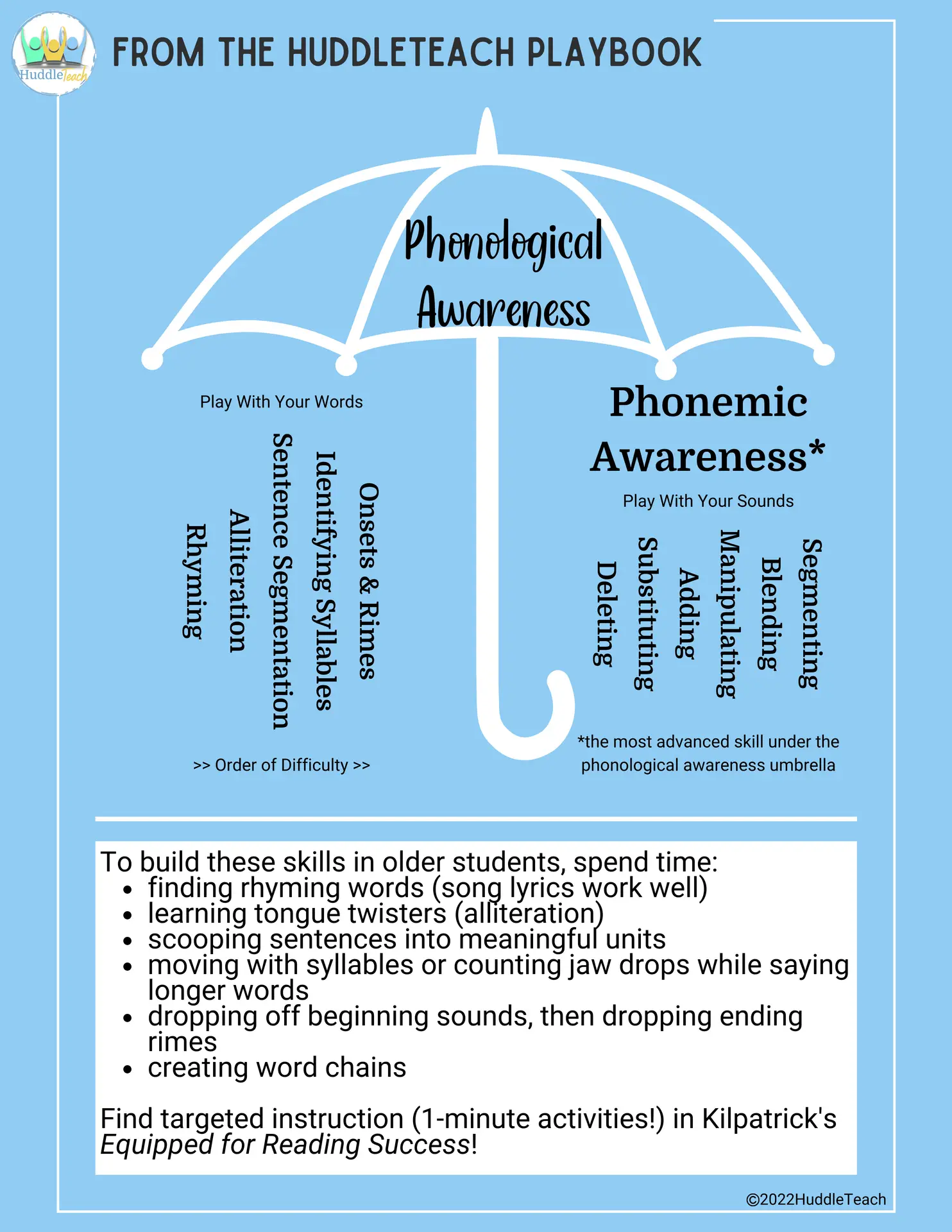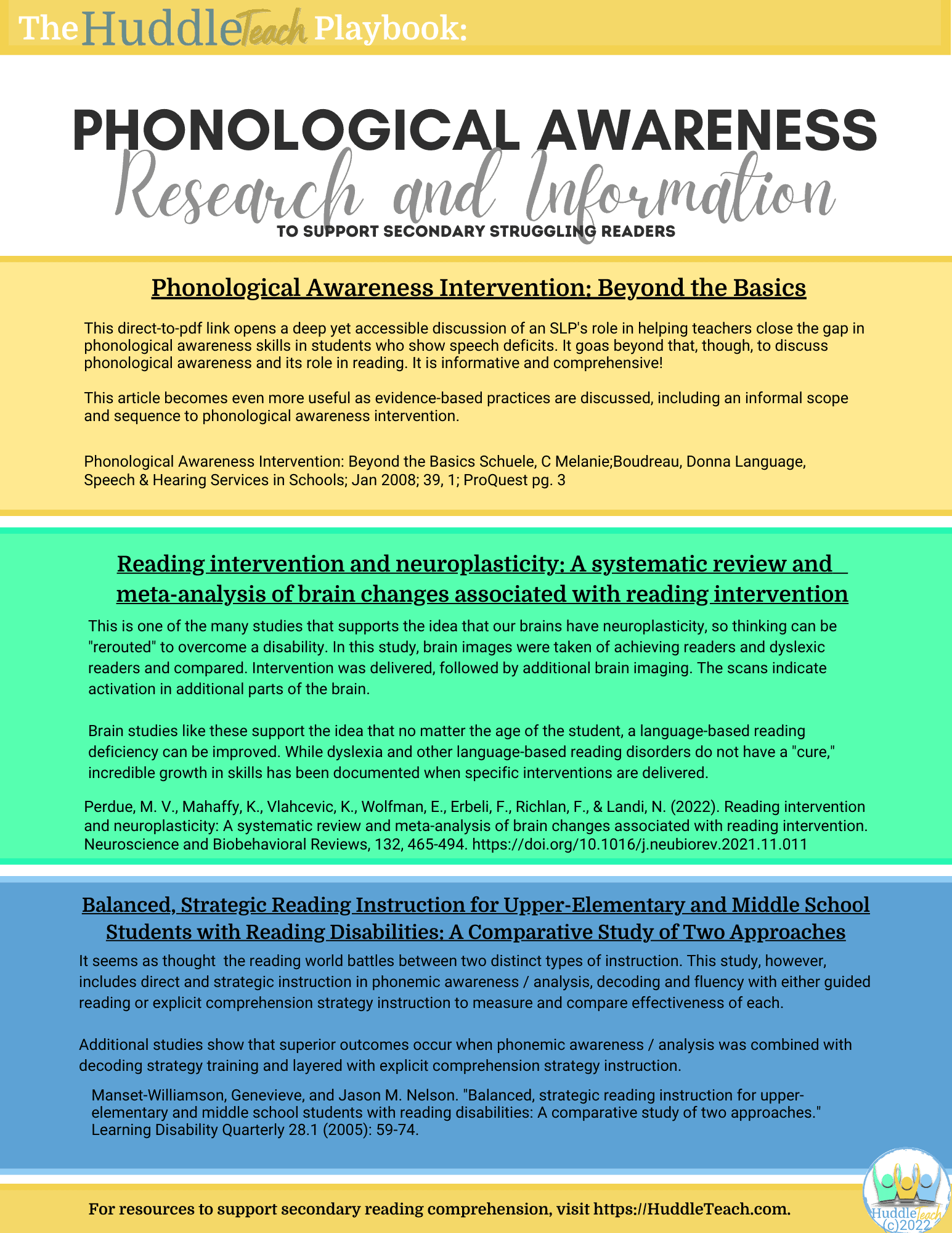Is this the skill your students are missing?

Do you have students who:
- lack fluency
- seem to be sight-word-readers with difficulty sounding out new words
- avoid reading and compensate when they do
- leave off parts of longer words, such as full syllables
- have trouble clapping / separating syllables
- cannot isolate sounds within words
- lack spelling skills
- have a difficult time hearing or identifying rhymes
- have trouble with alliteration activities
If so, they may have a phonological awareness deficiency!
Phonological what?
It is not uncommon to find secondary educators who are unsure of these terms – especially since they are associated with early reading skills. To be more clear, phonological awareness is part of a bigger category called phonological processing, or metalinguistic skills. And the good news is that all ages can learn these skills!
Phonological awareness is the ability to recognize that spoken words are made up of individual sound parts. At the surface level, this is the skill needed to divide words into syllables, identify and generate rhymes, and match words with similar beginning sounds, for example. At a more complex level, it is called phonemic awareness and involves manipulating, adding, deleting, and substituting sounds within words. This deeper level has been linked to reading success.
The other two metalinguistic skills – phonological memory and rapid serial naming (rapid automatized naming) – play an integral role in reading, too. Think of phonological memory as working memory for sounds, allowing the perception, storage, and reproduction of sounds from spoken words. Rapid serial naming includes the ability to accurately and rapidly name letters. While early readers are assessed on phonological processing skills, these assessments are often limited to the surface level of phonological awareness and rapid serial naming, “missing” some of the students who need support. These students grow into older readers who begin to struggle more in the intermediate and later years.



Download these pages and their copy-friendly counterparts in our Freebie Library!
Can older students develop phonological awareness?
Phonological awareness ability foretells the reading success of the young, and therefore carries the label “early elementary” – but it is not solely theirs! As a matter of fact, anyone missing this skill can learn it, no matter their age!
That point is of extreme importance to you as a teacher of older striving readers! Most students struggling with reading are missing this foundational skill. (Read more about the avalanche that happens on this recent blog.)
Here is relevant research to support your instruction of phonological awareness in the older grades. This is the newer (some from 2021!) research that has the reading world abuzz!

How do I know if my students really need this?
Want to tell for sure? A great free resource is the PAST Test, developed by David Kilpatrick, Ph.D. Download the instructions and forms on this site. Target your most worrisome students, first, though, as you will need to individually administer each test.
If you have students who need more formal testing, your testing team may suggest the CTOPP2 (Comprehensive Test of Phonological Processing, Second Edition).
Again, we will not be discouraged as more recent research shows that older struggling students benefit from phonological awareness activities! And don’t worry – this is one of the few skills in which a few minutes a day can make a big difference!
So how do I teach phonemic awareness to older students?
Phonological awareness is a auditory / verbal skill, not a written skill (then it becomes phonics), so word play involving the manipulation of sounds is the most valuable.
Remember the fun we’ve had trying to speak Pig Latin? While more able students can play with language that way, our students with executive functioning and weak working memory cannot complete those complex sound switching activities. Instead, they need targeted instruction along the continuum of phonemic awareness skills.
David Kilpatrick, Ph.D. has taken the work of earlier phonemic awareness researchers and expanded it into a very usable set of one-minute activities, designed to align with his PAST test, and meant to train readers of all ages in phonemic awareness.
His book, Equipped for Reading Success, is invaluable! If you are unsure, read this sample chapter, and preview a sample set of one minute activities. To see it in action, watch this YouTube video introduction, then this one in action.

Want to know more about decoding skill errors or working with struggling readers? Check out the linked blogs for raw experience driven information!
Remember, just a few minutes a day of targeted practice exponentially increases the effectiveness of your other interventions! Give it a try!
What seems to be your students’ biggest struggle? Feel free to comment below and let us know!


